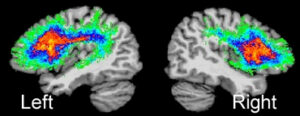
Stuttering brain research tries to describe the structure and function of the brain as it relates to stuttering. While the exact causes of stuttering are not fully understood, research has suggested that it is related to abnormalities in brain function and structure. In this blog post, we will explore some of the brain studies that have contributed to our understanding of stuttering.
Functional Magnetic Resonance Imaging (fMRI) studies have revealed differences in brain activity between people who stutter and those who do not. One study by Chang et al. (2008) found that people who stutter have reduced activation in the left inferior frontal gyrus (IFG) during speech production tasks. The IFG is known to be involved in the planning and execution of speech, and reduced activation in this area may contribute to the speech difficulties experienced by people who stutter.
Another study by Neef et al. (2015) used fMRI to investigate the neural mechanisms underlying stuttering. They found that people who stutter had increased activation in the right auditory cortex during speech production, suggesting that auditory feedback processing may play a role in the disorder.
Structural MRI studies have also provided insights into the brain differences associated with stuttering. One study by Foundas et al. (2004) found that people who stutter have a smaller planum temporale, a brain region involved in language processing. This finding suggests that structural differences in the brain may contribute to the speech difficulties experienced by people who stutter.
Recent research has also explored the role of genetics in stuttering. A study by Kang et al. (2010) found that mutations in the GNPTAB gene are associated with an increased risk of stuttering. This gene is involved in the production of enzymes that break down complex molecules in the body, and mutations in this gene may affect the development and function of the brain regions involved in speech production.
In conclusion, research into the brain mechanisms underlying stuttering has provided important insights into the disorder. The findings from these studies suggest that stuttering is associated with abnormalities in brain function and structure and that genetic factors may also play a role. This research has the potential to inform the development of more effective treatments for stuttering and improve our understanding of how the brain produces speech.
